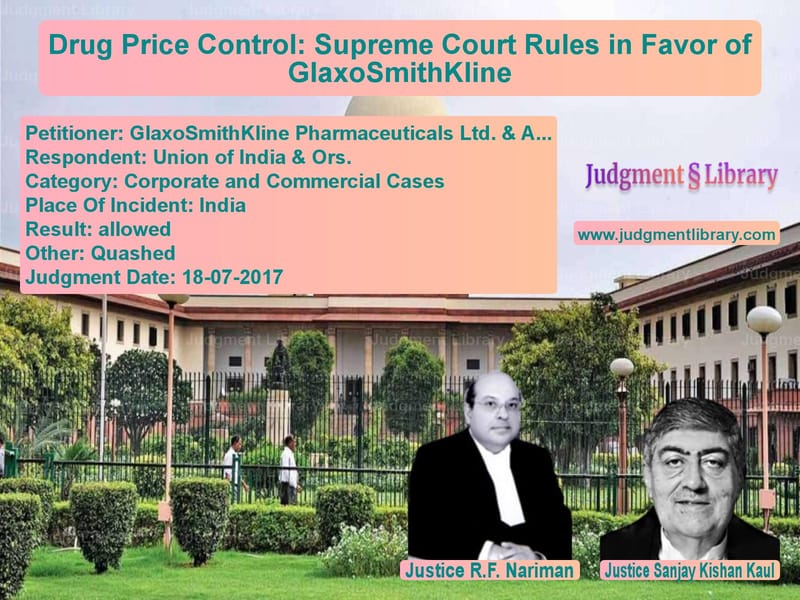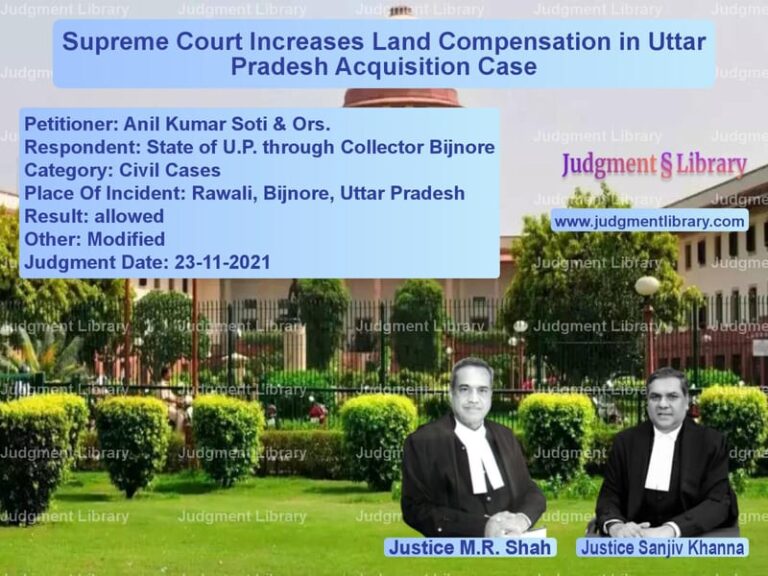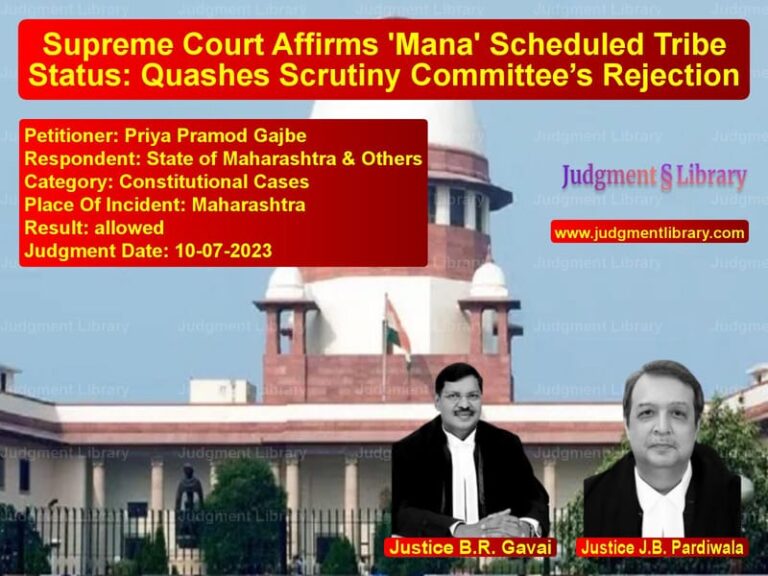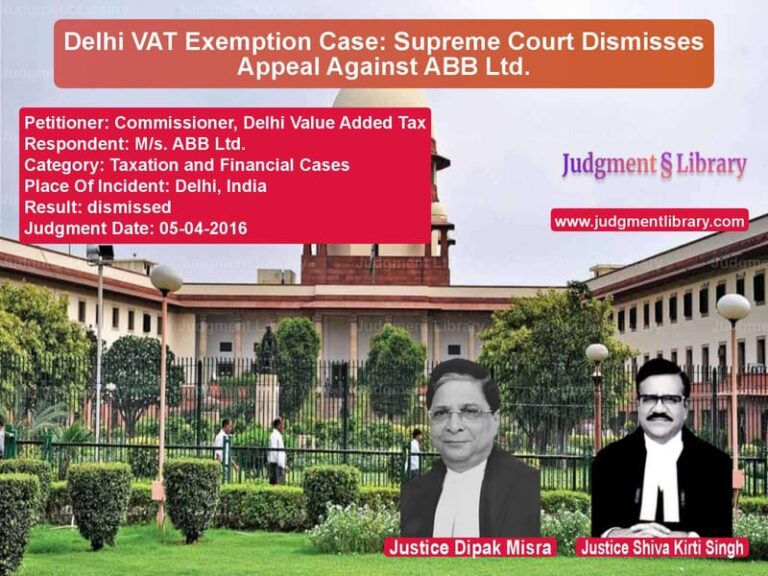Drug Price Control: Supreme Court Rules in Favor of GlaxoSmithKline
The Supreme Court’s judgment in GlaxoSmithKline Pharmaceuticals Ltd. & Anr. vs. Union of India & Ors., delivered on July 18, 2017, addressed a dispute regarding the applicability of drug price controls under the Drugs (Prices Control) Order, 1987 (DPCO, 1987). The ruling confirmed that price control exemptions for drug manufacturers apply to the date of manufacture rather than the date of sale, thereby protecting the rights of pharmaceutical companies that operated under the exemption period.
The case revolved around GlaxoSmithKline Pharmaceuticals Ltd. (GSK), which was granted an exemption from price control for a specific period. However, the government later demanded an excess recovery, arguing that drugs manufactured during the exemption period but sold later should be subject to price control. The Supreme Court ruled in favor of GSK, affirming that the exemption applied to all drugs manufactured within the specified timeframe, irrespective of their sale date.
Background of the Case
The dispute originated from an exemption granted to GlaxoSmithKline Pharmaceuticals Ltd. for the manufacture of Betamethasone Disodium Phosphate, a bulk drug. The exemption was issued under paragraph 28 of the DPCO, 1987, which allowed the government to exempt certain drugs from price controls based on factors such as R&D investments and indigenous manufacturing.
Key developments in the case:
- 1992: The Indian government granted a price control exemption to GSK until December 31, 1994.
- 1995: The exemption expired, and the government imposed price controls.
- 1997: A show cause notice was issued, alleging overcharging by GSK for drugs sold after January 1, 1995.
- 1999: The government demanded an excess recovery of Rs. 2.04 crores.
- 2004: The Bombay High Court upheld the government’s demand.
- 2017: The Supreme Court reversed the High Court’s judgment and ruled in favor of GSK.
Arguments by the Petitioner (GlaxoSmithKline Pharmaceuticals Ltd.)
The petitioner contended:
- The exemption applied to all drugs manufactured before December 31, 1994, even if they were sold later.
- The exemption order and government guidelines clearly referenced the date of manufacture, not the date of sale.
- Other companies had been treated similarly under the law, and GSK was unfairly targeted.
- The government’s demand violated principles of fairness and administrative consistency.
Arguments by the Respondents (Union of India)
The government countered:
- The exemption period expired on December 31, 1994, meaning any drugs sold after that date should be subject to price control.
- The price control regime aimed to ensure affordability, and retrospective application was justified.
- The demand for excess recovery was valid under paragraph 16(3) of the DPCO, 1987.
- Past judicial precedents supported their interpretation of the exemption order.
Supreme Court’s Observations
The Supreme Court, comprising Justices R.F. Nariman and Sanjay Kishan Kaul, made the following key observations:
“The exemption relates to drug manufacturing units, and the notification clearly states that it applies to drugs ‘manufactured’ by the company, not those merely ‘sold’ after the exemption period.”
“Government guidelines of 1989 further confirm that the exemption applies to the date of commercial production, not the date of sale.”
“A manufacturer cannot control when a drug is sold. If the exemption applies to manufacture, the government cannot impose retrospective price control based on later sales.”
Supreme Court’s Judgment
The Supreme Court ruled:
- The exemption granted to GSK was valid for all drugs manufactured until December 31, 1994, even if sold later.
- The government’s demand for Rs. 2.04 crores in excess recovery was invalid.
- Past judicial precedents supported GSK’s interpretation of the exemption clause.
- The Bombay High Court’s ruling was overturned.
Key Takeaways
- Exemption Applies to Manufacture, Not Sale: The ruling confirms that price control exemptions depend on the date of manufacture, not when the drug is sold.
- Government Cannot Retroactively Enforce Price Control: Companies cannot be penalized for selling exempted drugs after the exemption period.
- Legal Consistency in Drug Pricing: The decision ensures fairness and predictability in the pharmaceutical industry.
- Administrative Clarity: The judgment clarifies how exemptions under DPCO should be interpreted.
Impact of the Judgment
This ruling has significant implications for the pharmaceutical industry:
- Ensures clarity in drug price control exemptions.
- Prevents retrospective financial burdens on drug manufacturers.
- Reinforces the role of judicial review in administrative decisions.
- Strengthens investor confidence in the pharmaceutical sector.
Conclusion
The Supreme Court’s decision in GlaxoSmithKline Pharmaceuticals Ltd. vs. Union of India provides crucial clarity on the applicability of drug price control exemptions. By ruling in favor of GSK, the Court protected manufacturers from retrospective financial liabilities and ensured fair administrative practices in pharmaceutical pricing. This judgment serves as a key precedent for future drug pricing disputes.
Don’t miss out on the full details! Download the complete judgment in PDF format below and gain valuable insights instantly!
Download Judgment: GlaxoSmithKline Phar vs Union of India & Ors Supreme Court of India Judgment Dated 18-07-2017.pdf
Direct Downlaod Judgment: Direct downlaod this Judgment
See all petitions in Company Law
See all petitions in Corporate Compliance
See all petitions in Bankruptcy and Insolvency
See all petitions in Judgment by Rohinton Fali Nariman
See all petitions in Judgment by Sanjay Kishan Kaul
See all petitions in allowed
See all petitions in Quashed
See all petitions in supreme court of India judgments July 2017
See all petitions in 2017 judgments
See all posts in Corporate and Commercial Cases Category
See all allowed petitions in Corporate and Commercial Cases Category
See all Dismissed petitions in Corporate and Commercial Cases Category
See all partially allowed petitions in Corporate and Commercial Cases Category







